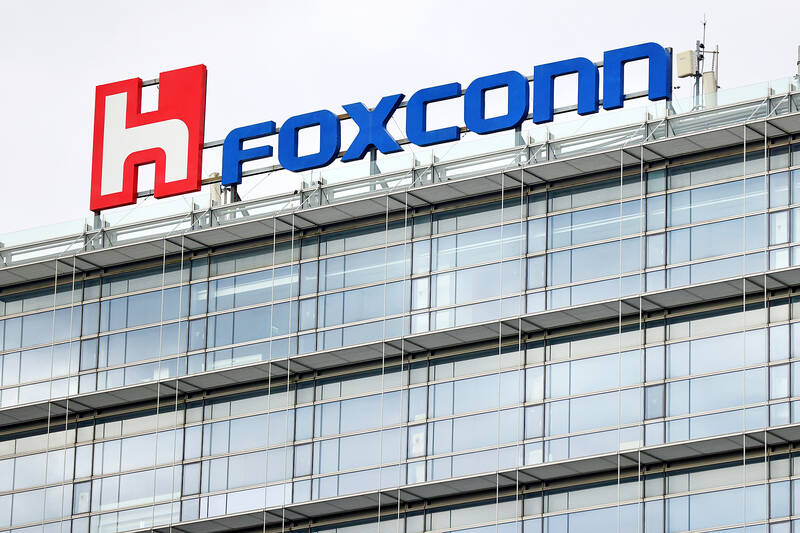Hon Hai Precision Industry Co (鴻海精密), also known as Foxconn Technology Group (富士康科技集團) internationally, on Wednesday announced a semiconductor packaging and testing service joint venture with India’s HCL Group.
The iPhone assembler said in a statement that its subsidiary Foxconn Hon Hai Technology India Mega Development Private Ltd has teamed up with HCL to set up a semiconductor joint venture in India.
By investing US$37.20 million, the subsidiary secured a 40 percent stake in the outsourced semiconductor assembly and test (OSAT) joint venture, which has set its sights on India’s semiconductor market, it said.

Photo: EPA-EFE
An OSAT service provider packages, assembles and tests wafers made by pure-play wafer foundry operators, turning them into finished semiconductor chips.
Through its investment, Hon Hai said it is looking forward to working with HCL, one of India’s leading software and engineering firms, to establish a semiconductor ecosystem and expects that cooperation would enhance supply chain resilience in the South Asian country.
Hon Hai said it would continue a build-operate-localize (BOL) business model to support Indian communities.
A report from the business news outlet Mint cited industry insiders as saying that HCL has had semiconductor design and testing software expertise for a long time, and following its existing partnerships with several leading chipmakers, a partnership with Hon Hai made sense for both sides.
In July last year, Hon Hai announced it would be pulling out of a US$19.5 billion joint venture with Indian conglomerate Vedanta Group to make semiconductors in India. Indian media reports said that the breakup might have been caused by the slow pace at which the joint venture was proceeding.
The reports said the project was hindered by a lack of technical partners and because the Indian government had required that the joint venture resubmit applications for awards and subsidies.
While the cooperation with Vedanta fell apart, Hon Hai chairman Young Liu (劉揚偉) told investors in November last year that the company would continue to push for semiconductor investments in India through the BOL business model.

When an apartment comes up for rent in Germany’s big cities, hundreds of prospective tenants often queue down the street to view it, but the acute shortage of affordable housing is getting scant attention ahead of today’s snap general election. “Housing is one of the main problems for people, but nobody talks about it, nobody takes it seriously,” said Andreas Ibel, president of Build Europe, an association representing housing developers. Migration and the sluggish economy top the list of voters’ concerns, but analysts say housing policy fails to break through as returns on investment take time to register, making the

‘SILVER LINING’: Although the news caused TSMC to fall on the local market, an analyst said that as tariffs are not set to go into effect until April, there is still time for negotiations US President Donald Trump on Tuesday said that he would likely impose tariffs on semiconductor, automobile and pharmaceutical imports of about 25 percent, with an announcement coming as soon as April 2 in a move that would represent a dramatic widening of the US leader’s trade war. “I probably will tell you that on April 2, but it’ll be in the neighborhood of 25 percent,” Trump told reporters at his Mar-a-Lago club when asked about his plan for auto tariffs. Asked about similar levies on pharmaceutical drugs and semiconductors, the president said that “it’ll be 25 percent and higher, and it’ll

CHIP BOOM: Revenue for the semiconductor industry is set to reach US$1 trillion by 2032, opening up opportunities for the chip pacakging and testing company, it said ASE Technology Holding Co (日月光投控), the world’s largest provider of outsourced semiconductor assembly and test (OSAT) services, yesterday launched a new advanced manufacturing facility in Penang, Malaysia, aiming to meet growing demand for emerging technologies such as generative artificial intelligence (AI) applications. The US$300 million facility is a critical step in expanding ASE’s global footprint, offering an alternative for customers from the US, Europe, Japan, South Korea and China to assemble and test chips outside of Taiwan amid efforts to diversify supply chains. The plant, the company’s fifth in Malaysia, is part of a strategic expansion plan that would more than triple

Taiwanese artificial intelligence (AI) server makers are expected to make major investments in Texas in May after US President Donald Trump’s first 100 days in office and amid his rising tariff threats, Taiwan Electrical and Electronic Manufacturers’ Association (TEEMA, 台灣電子電機公會) chairman Richard Lee (李詩欽) said yesterday. The association led a delegation of seven AI server manufacturers to Washington, as well as the US states of California, Texas and New Mexico, to discuss land and tax issues, as Taiwanese firms speed up their production plans in the US with many of them seeing Texas as their top option for investment, Lee said. The